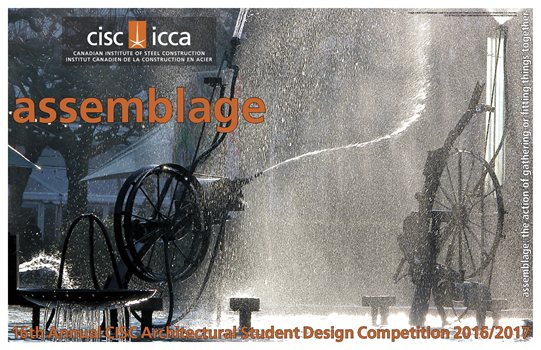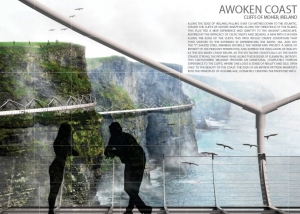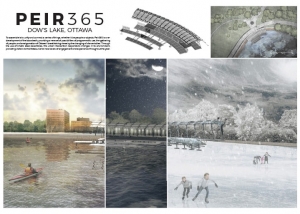2016- 2017
The Challenge
In consulting Wikipedia for the meaning of “assemblage” a number of possibilities appear. From a composition perspective, it can refer to text that is “built primarily and explicitly from existing texts to solve a writing or communication problem in a new context.” Within an architectural context, Pamela Popeson of the MoMA refers to assemblage as an architectural tool that “offers a dynamic, inventive connection to cultural context.”
In terms of this competition, Assemblage is an invitation for students to explore architectural connections, be they connections between context and structure, or the connections that allow an assemblage of materials and structural elements to come together to form a structural whole. In that sense, the 2016-2017 CISC Architectural Design Competition invites students to explore the utilization of steel as the primary structural element that makes an assemblage possible.
Students are challenged to design a structure that explores ‘assemblage’ on a site of the designers’ choosing. While the purpose and scale are left to the discretion of the designer, it is important to focus on what it means for us to engage and experience assemblage. The structural focus must utilize exposed steel as a primary structural material, but otherwise, the material palette is open.
Competition Statement
The intention of this design competition is primarily to provide students of architecture in Canada with a unique opportunity: to enter into a design process that brings together, of necessity, concept and reality. It is important for students of architecture to grasp the fact that structural design lies not just in the realm of the engineer, but can be a means for architects of arriving at a meaningful realization of architectural ideas. It is when theory meets physical necessity that architecture can become really interesting.
To that end, this competition calls upon students to conceptualize, and realize in detail, a structure of simple program that explores the meaning of assemblage. The exploration will, of course, include issues related to program and site, but the emphasis in this competition is upon the architectural exploration through form and material, on the essential relationship between architecture and structure.
The reality of this competition comes in two forms: through the requirement for buildable details, primarily utilizing structural steel; and through the collaboration with the steel fabrication industry on those details. This collaboration is an important component of this competition, as a secondary objective is to expose students to both the opportunities and restraints inherent in realizing conceptual design.
The conceptual component of this competition will come through the recommendation that this competition be run through either a studio, or a lecture based course, most probably within a structures course. Under the guidance of faculty sponsors, students will conduct the design process as an academic exercise, within the guidelines set out in this brief. As an academic project, the design process will adhere to the standards set forth by the students’ school of architecture.




